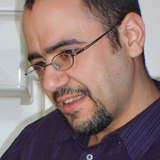 The cleaner popped his head round the door, “You nearly finished, doc? Or are you happy to lock up?” The GP glanced at the bottom right corner of the glowing monitor that he had been looking at for the last two hours since the last patient left.
The cleaner popped his head round the door, “You nearly finished, doc? Or are you happy to lock up?” The GP glanced at the bottom right corner of the glowing monitor that he had been looking at for the last two hours since the last patient left.
“No, I’m fine thanks,” he answered, “I’m happy to lock up, I’ve done it enough times,” which was true enough. Two hours previously he had had to weigh up finishing off reading the patient letters and reviewing patients that weren’t hitting blood pressure targets in the surgery, or getting home in time to kiss the children goodnight and peering at a laptop with remote, yet slower, access to the surgery computer system.
“Just seen a frog by the back door,” the cleaner was still at the door.
The doctor looked up, “My kids would have loved to see that. Funny the things that cheer us up, eh?”
“Good night, doc. Don’t work too late,” the door shut and he rubbed his eyes and stretched in his chair. He then minimised his computer system and starting typing an email to his local MP.
“Apparently you can boil a frog alive. The trick is to place the frog in a pan of cold water and then gently heat it up. As the frog doesn’t notice the gradual change in temperature it doesn’t jump out until it’s too late. If, on the other hand, you drop a frog into a pan of very hot water, they simply jump out.
The heat is slowly increasing on general practice. There is the pressure of time. Although GPs don’t have to provide out of hours services for their own patients, there is increasing political pressure for them to work extended, unsociable hours in order to try to relieve the pressure on struggling emergency departments.
At the same time, we are spending more time going to meetings for the clinical commissioning group, the local provider company, the locality network, the admission avoidance scheme, the new sexual health provider, the new drug rehabilitation scheme launch, dementia awareness education, etc. We are also spending more time dealing with increasingly complex discharge summaries and clinic letters asking us to take over and prescribe for specialist health conditions, which hospitals no longer seem to have capacity for.
As well as having pressure put on us to keep our most vulnerable, usually sickest, patients out of hospital, we are also being asked to reduce our prescribing costs and manage our referrals to further alleviate the pressure on struggling NHS trusts. Further heat comes from unrealistic patient expectations for instant care, based on an often mistaken assessment of what constitutes a medical emergency. The older ones are simply getting older and more complicated, victims of our successful advances in public health and medicine.
GPs are cleverer, for the most part, than frogs. Some of us have already hopped out of the pan across to the promised land Down Under, or to careers as locums, casting aside our previous administrative burdens. Some of the older ones have simply decided that they have had enough. The challenge of inviting these GPs back and bringing young prospective GPS into a hotter and hotter pan of water is an unenviable and impossible task, made even more difficult by the hand of the media, constantly berating general practice, turning up the heat even further at every opportunity.
Lastly, there is the promise of years of austerity, meaning that the prospect of alleviating the system with more GPs is limited. Primary care will continue to compete with secondary care for a fair slice of funding. Health will compete with social care and education on a larger scale.
In the meantime most of us are stuck in the pot, hoping for a miracle, knowing that more than a few of us are beginning to really feel the heat. Not so much burnt out as boiled alive.”
He saved the draft and flicked back to the patient letters that needed reviewing.
Samir Dawlatly is a GP partner at Jiggins Lane Surgery in Birmingham. He combines clinical practice with being a part time house husband and an interest in social media, as well as publishing poems, essays, and blogs. He can be found on Twitter as @sdawlatly.
Acknowledgements: with thanks to Phil Scott for helping crystallise these thoughts.
I have read and understood BMJ policy on declaration of interests and declare the following interests: I am a member of the RCGP online working group on overdiagnosis.
